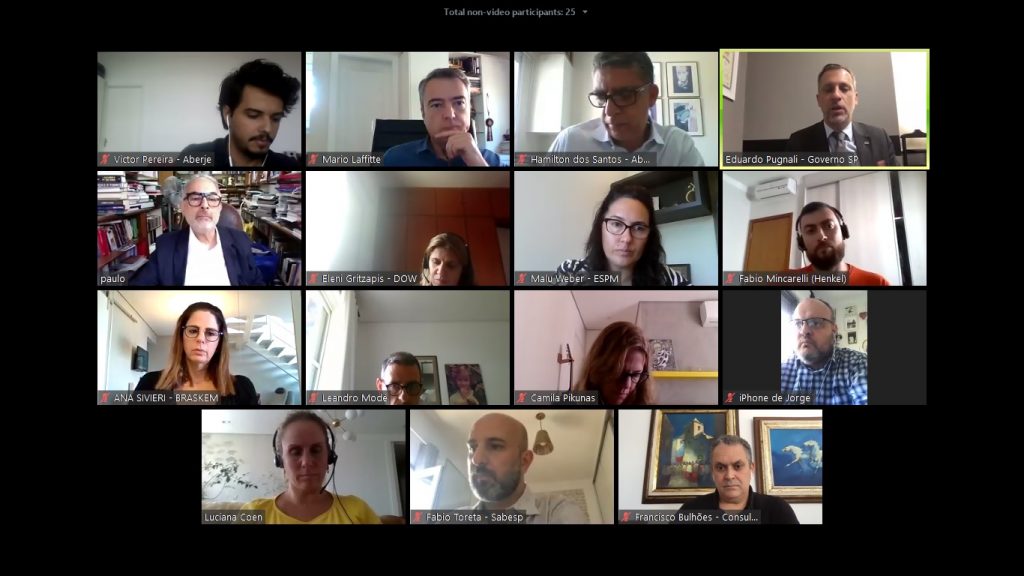LiderCom brings together CCOs to talk about the crisis

Meetings discussed the lockdown in the state of São Paulo and responsibility of the private sector

Aberje held an online meeting of LiderCom – the leading group of Brazilian business communication – to answer any questions from its members about Quarantine Decree 64.881/20, released on March 22 by the government of the State of São Paulo. Eduardo Pugnali, executive secretary of the Special Secretariat for Communication of the Government of the State of São Paulo, was the special guest in the online meeting, which was attended by 40 leaders of business communication and mediated by Paulo Nassar, Aberje’s president and full professor at ECA-USP.
According to Pugnali, there is still a lot to adjust. “There are many questions and doubts about the decree, in addition to communication pieces. We are aware of the need to align all actions with state governments, in addition to the important exchange of experience. Other decrees will emerge”, he said. “Each decree is like a layer of protection.”
According to the secretary, the challenge now is to align speeches at municipal, state, and federal levels. Among the questions during the meeting, communication professionals asked about the unification of communication processes in these spheres. Another point raised by one of the participants regards the strength of the economy in the face of so many changes caused by the quarantine. Pugnali said that the main priority at this point is not to collapse the public and private healthcare system. “This is all new to our generation and we will have to have a ‘post-coronavirus plan’. Just like governments, large corporations will have an important role: that of recovering the economy.”
The meeting, held by videoconference, was attended by the leaders of corporate communication of companies such as: Accor, Alstom, Amaggi, Avon, Boticário, Braskem, Brookfield, CNH Industrial, CPFL, Dow, ESPM, Fundação Dom Cabral, Henkel, International Paper, Itaú, Localiza, Natura, Sabesp, Samsung, SAP, Thales Group, Toyota, Unisys, and Via Varejo, among others.
Another LiderCom meeting earlier this month dealt with how to guide employees, take care of people, mitigate problems, plan an agenda, and learn from the coronavirus situation. What about contracts with major events that have already been released? What about hotels and flights already closed? How to terminate a contract with so many sensitive points involved? For now, there are no definitive answers to these questions, but it is possible to think of some ways.
For Juliano Nóbrega, CEO of CDN Comunicação, who brought some tips to the meeting, the most important thing at the moment is to trust the public healthcare authorities and the technical information of the specialists, before making any internal decision.
How companies can act during the Covid-19 crisis:
1. Guiding … and offering conditions for employees to take preventive actions based on official guidelines.
2. Taking care … of people, checking if there is someone in the company or family members have the symptoms and maintain the employee’s privacy.
3. Mitigating… balancing the containment measures and, if necessary, creating conditions for the remote work of employees, preserving the health of all and thus keeping the company in operation.
4. Planning… outlining possible future scenarios and from there analyze the real need for a trip, for example, as well as design a home office policy for employees.
5. Learning… every crisis brings lessons and promotes changes such as the improvement of the company’s technological structure, aiming at more productive remote meetings.
Destaques
- Retrospectiva Aberje 2024: mundo em crise e transição
- Tema do Ano “Comunicação para a Transição” é renovado para 2025
- Valor Setorial Comunicação Corporativa 2024 analisa importância das conexões e da transparência na Comunicação
- Aberje participa de jantar comemorativo dos 25 anos da Fundação Gol de Letra
- Web Summit Lisboa 2024: Inovação e ética em um futuro moldado pela IA
ARTIGOS E COLUNAS
Patricia Marins Meta e o fim da checagem de fatos: por que a Dieta da Comunicação é essencial para a gestão da reputação em 2025Thais Andreoli Gestão de crises: transparência ou discrição?






























